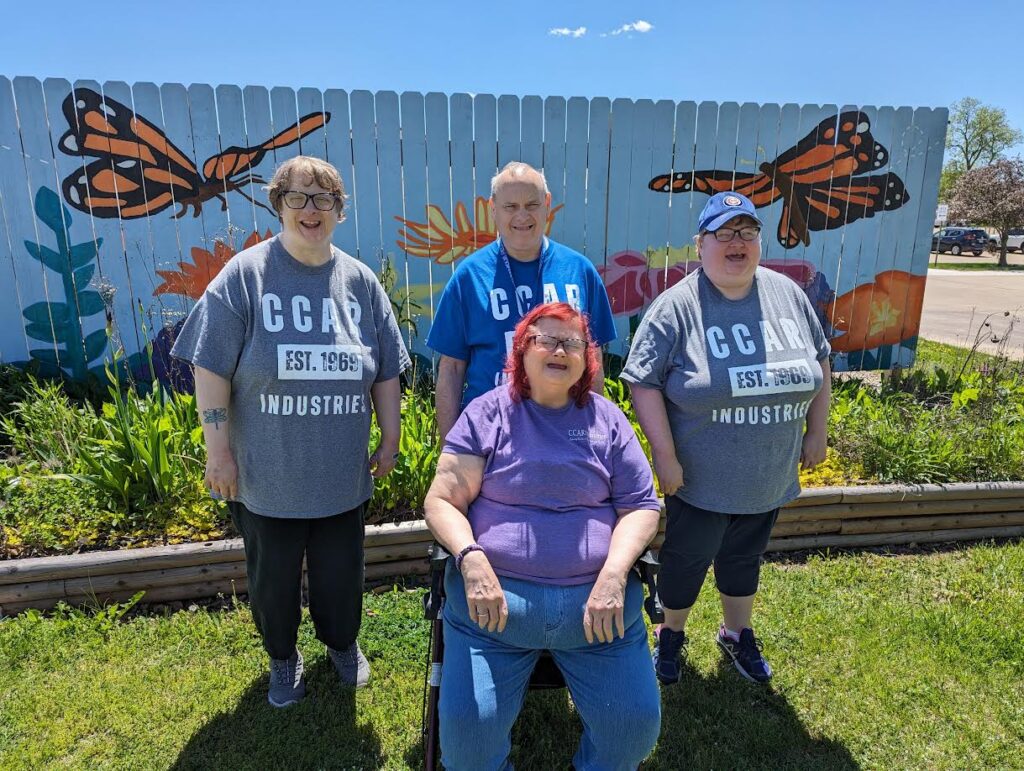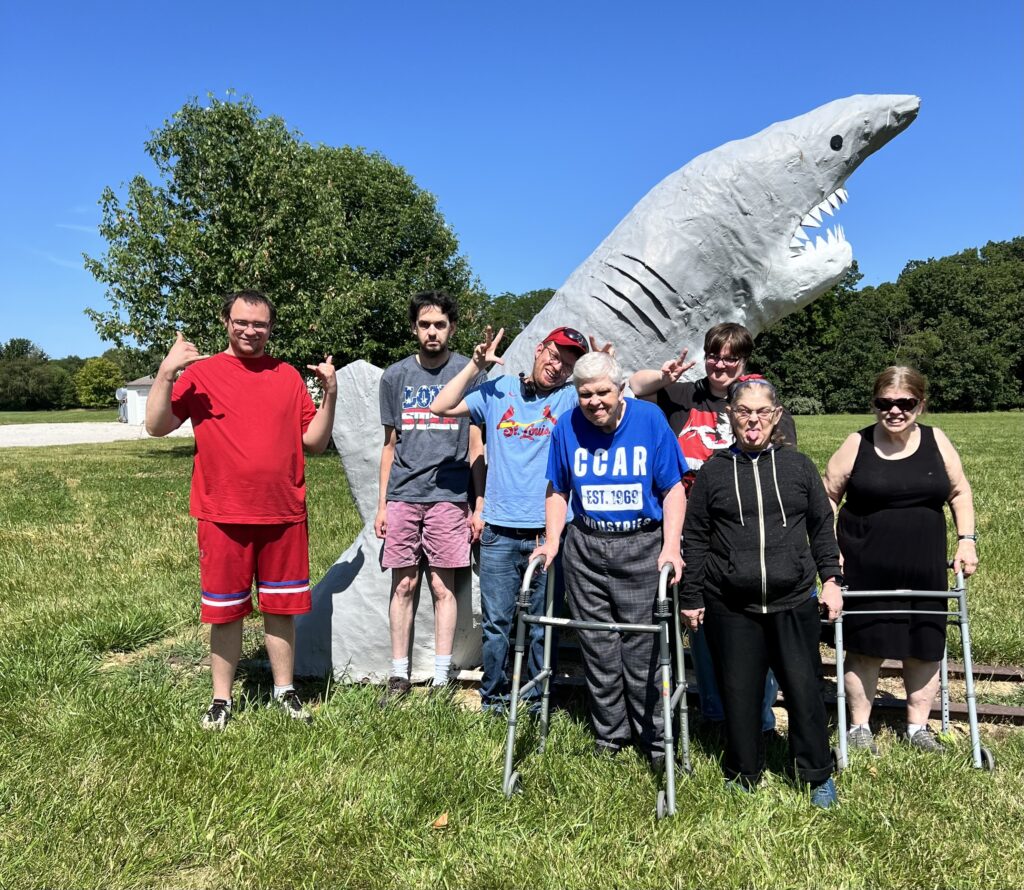
Frequently Asked Questions
What is the Dignity in Pay Act?
The Dignity in Pay Act is an Illinois law that sunsets the payment of subminimum wage for individuals with disabilities in Illinois. Subminimum wage work will end on December 31, 2029.
How does this impact CCAR Industries’ day programs and the work that is performed?
The law says that any work performed after December 31, 2029 must be paid at the State’s minimum wage. This means that everyone working at the programs, whether it is doing recycling at the Lincoln Avenue program or contract work at the Manufacturing Plant must be paid minimum wage for the work that they do.
During the next few years, CCAR Industries will be reviewing our work contracts to determine if they can support the payment of minimum wage. Once we have that information, we can make a decision on whether or not that work will continue.
If work doesn’t continue in the program, what will happen instead?
Although we are still working on our transition plans, the intent is for the programs to provide alternatives to center based work. Current programs in development include the following:
- Assistance obtaining and maintaining jobs in the community for those interested in a job in the community
- Development of meaningful day opportunities that connect individuals to volunteer and other opportunities in the community that are meaningful to the individual. This could include assisting an individual to join a community group, connecting to volunteer opportunities, researching and exploring a specific hobby or interest, etc.
- Recreation and social based activities focused on fun while building and maintaining friendships with peers
If you have a good idea you think we should pursue, please let us know.
What about transportation?
We will continue to provide transportation services to and from day program services as they currently operate. Individuals that receive on-going supports and job coaching will continue to receive transportation services as part of the day program services provided.
For those individuals seeking a job in the community, access to reliable transportation to and from work will be part of the job search process. Transportation to and from a community job is typically not a funded service.
Will you continue to be open Monday through Friday for my family member to attend while I go to work?
Yes. We do not anticipate any changes to our days and hours of operations at this time.
Who can help me find a job in the community, if I want one?
CCAR Industries plans to apply for funding from the Division of Rehabilitation Services to provide community job placement services with the intent to begin providing those services in July 2026. If you want those services now, you would need to contact the Division of Rehabilitation Services and seek those services from a different provider.
Why can’t CCAR Industries’ just let individuals volunteer to do the work they are currently getting paid to do? Why can’t you just keep doing recycling and only let a couple of people work.
CCAR Industries has to comply with all State and Federal labor laws. Failure to do so places the agency at risk legally and financially. Whatever we do has to be in compliance with these laws. More specifically, individuals cannot volunteer to do jobs that produce goods that are sold for the benefit of the company. CCAR Industries would still need to sell the recycled products to cover any remaining costs to the programs which include: shipping and materials and upkeep on the balers and other equipment used.
In addition, CCAR Industries faces a higher level of scrutiny since it is considered a segregated setting for individuals with developmental disabilities. Remember, individuals with disabilities have a long history of being denied access to the community and continue to face segregation and discrimination. Access to the community is a civil rights issue.

Are individuals with disabilities expected to get full time jobs in the community?
Community employment looks different for every individual. Some individuals may want to work full time. Others may only want to work an hour or two a week. Others may work seasonally – such as selling a product at a local farmer’s market or during the holidays on Etsy.
Additionally, work opportunities are going to depend on where an individual lives and the types of employers in the local community. For example, if I don’t have transportation to get to and from a job – then I need a job that I can get to by walking or riding a bicycle.
We also recognize that some folks don’t want to work in the community and that’s okay with us.
Does CCAR Industries expect everyone to spend the ENTIRE day, EVERY day in the community?
No, this isn’t realistic. Instead, we are hoping to increase opportunities for individuals to access their community in a meaningful way based on their individual interests. We want to expand this beyond tourist activities and eating out. The purpose is for individuals to develop, maintain, and grow relationships within the community. Examples include:
An individual wants to work at a restaurant. They may be part of a group at the day program that learns about jobs at a restaurant and what skills are needed to do those jobs. These discussions could also include building social and hygiene skills. They may listen to presentations from people who own or work in a restaurant. Their community contact might include a tour of a restaurant or going to watch the employees in action.
An individual doesn’t want a job, but really likes gardening and growing flowers. Their day may include exploring the plants that grow best where we live. They might grow plants from seeds and then plant them in larger containers. Their community connections could come from volunteering at the Whiteside garden, joining Master Gardener events, or donating flowers they’ve grown to local nursing homes.
Who pays for my community activities?
Currently, CCAR Industries requires individuals served to pay for their own meals or purchases made in the community. That practice will continue. At the same time, CCAR Industries will continue to prioritize free or low cost opportunities in the community versus those that cost money.
What if I don’t want to participate in community activities, will I still get to come to the program to hang out?
We aren’t going to force anyone to do something that they don’t want to do. Our hope is that we will be able to identify something that they want to do while they are at the program by developing Positive Personal Profiles with each individual that attends our day programs. The Positive Personal Profile is a tool that identifies an individual’s preferences, skills, and abilities. This information is then used to develop their meaningful day activities. Many of the individuals that CCAR Industries serves have had very little involvement in or exposure to their local community. They don’t know what they do or do not like to do. For those individuals, their meaningful day activities will be offering opportunities to learn more about their local community.
What if my health makes it hard for me to come to the programs all the time, will I be kicked out of the program?
CCAR Industries’ mission is to empower lives through individual care and inclusive community support. We do this by providing various supports and services. Unfortunately, the majority of our revenue for providing those supports and services is based on attendance.
Our goal is to provide supports and services that results in individuals wanting to come to our programs every day. We recognize that full time attendance for some individuals is not possible. Our preference is to schedule those absences as much as possible so we can maintain staffing levels to provide quality services. We do not plan on kicking anyone out of their program; however, when someone is no longer attending a program, planning meetings should occur to develop a plan that meets the need of the individual and the program.
If I get a community job, how will this impact my Social Security and Medicaid benefits?
CCAR Industries can help you connect with the Benefits Planning Program with the Illinois Department of Human Services. This program provides free counseling and can explain how work will affect your benefits. They will also offer assistance on how to use work incentives and make informed choices on how to successfully transition to work.
How will staffing change at the day programs?
We anticipate that every staff member working at our day programs will continue to work at our day programs. While we don’t have specifics yet, we do know their duties will undergo some changes as we move away from center based work opportunities to meaningful day activities. We also know that additional training will be needed to help them adjust to the changes. This training will be part of our transition plan.
